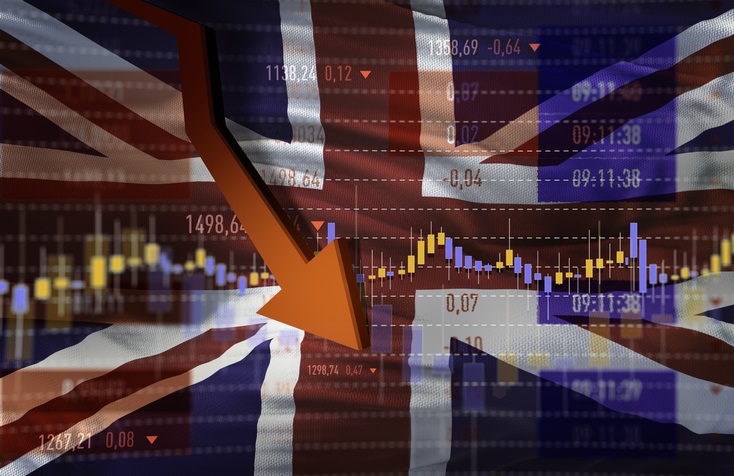Stock market slumps amid warning of 7% inflation
6th October 2021 15:15
by Graeme Evans from interactive investor
With energy costs surging again and prices rising fast elsewhere, investors are worried about what that could mean for interest rates.

Worried investors ran for cover today after an “extraordinary” surge in natural gas prices raised inflationary expectations and put more pressure on central banks to raise interest rates.
The FTSE 100 index was 1.5% lower at below the 7,000 threshold after a sell-off triggered by fears that spiralling energy bills and supply chain costs will choke off the economic recovery.
Consumer-focused Next (LSE:NXT) and JD Sports Fashion (LSE:JD.) were among blue-chip stocks more than 4% lower, while Rolls-Royce (LSE:RR.) and British Airways owner IAG (LSE:IAG) also fell sharply.
Natural gas futures for November delivery were already at a record when they jumped by another third this morning to reach over 400p a therm, although the price later fell back to near to its opening mark. Prices have been driven by a shortage of supplies at a time when economies are rebuilding from the pandemic and as the northern hemisphere gears up for winter.
- Energy crisis: investor Q&A and share tips
- Spectre of inflation is trigger for investors to tweak portfolios
- The shares Nick Train is backing to shield against inflation
The extreme upward moves are now being reflected in market expectations for the future rate of RPI inflation, which Deutsche Bank said now pointed to a figure of 7% in April. This is the month the energy regulator Ofgem updates its price cap for utility bills.
Typically, the gap between the retail prices benchmark and the government's preferred CPI measure is around 1% but Deutsche Bank said this tends to widen when energy spikes.
Senior research analyst Jim Reid called the gas spike extraordinary, adding: “Regardless of which inflation gauge is used, it’s fair to say that the cost of living is going up fast.”
He notes that RPI is still used to set train fares and student loan rates, meaning some newly employed workers could in theory be facing 10% interest if the situation persists.
Households have now enjoyed two decades of low inflation, but Reid notes that UK inflation has actually averaged 5.3% in the past 50 years. He added: “It would take a brave person to receive a low fixed income (e.g. government bonds) for any length of time with all the transitory, cyclical and structural inflation in the pipeline.”
Bank of America's UK economist Robert Wood now expects a 45% hike in Ofgem's price cap in April, rather than previous expectations for a 25% rise. This leads to a new forecast peak for CPI in that month of 5.1% and 5.8% for RPI, before base effects cause a sharp retreat.
The longer the spike in natural gas prices continues, however, the more likely central banks will be under pressure to raise interest rates in order to head off the inflation threat. The Reserve Bank of New Zealand has done just that for the first time in seven years, making it one of the first to reverse pandemic support in a move last night largely predicted by markets.
- Inflation is the big risk: here's what else is worrying fund managers
- Inflation-proofing ideas for equities, funds and trusts
- ii Top Ten: things you need to know about inflation and your money
Attention now turns to November's Bank of England policy meeting, where markets think there's now a one-in-four chance that rates will rise. Friday's jobs report will go a long way towards determining the path towards tighter policy in the US, although a particularly weak number has the potential to stoke stagflation fears.
The main impact of higher energy prices so far appears to be inflationary, rather than lower consumption or investment activity. UBS's Mark Haefele, chief investment officer of global wealth management, continues to believe that “reflation, not stagflation, is the right outlook”.
His note today points to the ongoing normalisation of global economic activity as the pandemic incrementally becomes more manageable, as well as hopes that supply chain stress has peaked and is at least partially priced into impacted stocks.
Haefele also highlights signs that growth is accelerating in the US after its surprise slowdown in the third quarter, with oil prices expected to end the year at around current levels.
These articles are provided for information purposes only. Occasionally, an opinion about whether to buy or sell a specific investment may be provided by third parties. The content is not intended to be a personal recommendation to buy or sell any financial instrument or product, or to adopt any investment strategy as it is not provided based on an assessment of your investing knowledge and experience, your financial situation or your investment objectives. The value of your investments, and the income derived from them, may go down as well as up. You may not get back all the money that you invest. The investments referred to in this article may not be suitable for all investors, and if in doubt, an investor should seek advice from a qualified investment adviser.
Full performance can be found on the company or index summary page on the interactive investor website. Simply click on the company's or index name highlighted in the article.